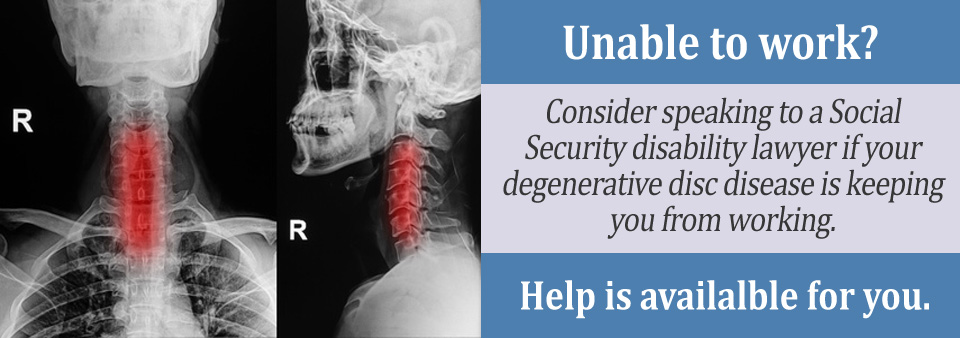How Degenerative Disc Disease Impacts Your Ability to Work
Degenerative disc disease is a spinal disorder in which the soft, cushiony discs that sit between the vertebras of the spine break down over time, resulting in a number of symptoms.
Nerve and muscle pain, and spinal inflexibility are among the most common and the most difficult to deal with.
In addition to pain and stiffness, people with degenerative disc disease may also experience other neurological symptoms, like numbness, tingling, weakness in the muscles, and loss of balance.
The location of the degenerative disc disease can also affect your symptoms. For example, issues with the discs in the neck may cause headaches as well as other, more common symptoms.
Individuals with degenerative disc disease can be severely limited by the condition. If you work in a physical job or a sedentary one, the pain of degenerative disc disease can be enough to prevent you from performing both mental and physical job duties. Degenerative disc disease is one of the spine disorders that qualify for disability. If you cannot work due to degenerative disc disease, you may qualify for disability.
Whether or not you can continue to work with degenerative disc disease is usually determined by the degree of degeneration from which you suffer and the involvement of nerves and muscles.
If you are living with degenerative disc disease in your neck, if it is severe enough, it may cause you to be out of work for at least 12 months. One of the most common side effects of living with degenerative disc disease in the neck are cervicogenic headaches, which are headaches caused by spinal problems in the neck, such as degenerative disc disease.
If you are suffering from cervicogenic headaches, due to your degenerative disc disease, it make cause you have difficulty working, whether your job is physically demanding or more sedentary.
If you’re living with degenerative disc disease in the neck and you’ve exhausted all options to reduce the pain and if you think you won’t be able to work for at least 12 months because of it, then you may want to apply for Social Security Disability Insurance.
Before you apply make sure to check the SSA’s Blue Book so you know what medical evidence you need in order to qualify with degenerative disc disease. It is recommended that you consult with your doctor, whether it be your primary care or specialist before applying. After you send in your initial SSDI application, you will hear back with a decision from the SSA in 3 to 5 months. Many claims are often denied disability on the initial application. You can then file an appeal. Be sure to look out for the signs that you will be denied for disability.
Degenerative Disc Disease and Physical Capacity
If you have traditionally worked in jobs in which you had to frequently lift, carry or push and pull heavy items or perform other more strenuous physical job duties, then you may be unable to continue to work with degenerative disc disease.
Pain in performing physical job duties is the most common limitation that people with degenerative disc disease experience, but loss of flexibility is also very common.
As the degenerative disc disease advances, many people experience loss of motion in their spine. The area of the spine in which degenerating discs are present becomes less flexible and twisting, turning, bending or stooping may become a problem.
Sitting or standing for long periods of time can also be a common concern for people with degenerative disc disease, and the ability to perform essential job functions can be compromised as a result.
Degenerative disc disease may or may not cause severe symptoms. Whether you’re able to continue to work with the condition will depend on the symptoms you experience and how often they occur.
The severity of the pain you suffer and the loss of flexibility you experience will also be important factors influencing whether you’re able to maintain gainful employment.
Here is some additional information on what you should do if you want to file for Social Security disability benefits if you have degenerative disc disease.

Degenerative Disc Disease and Mental Capacity
The symptoms of degenerative disc disease are physical in nature and generally have little to no affect on a person’s mental capacity. That being said, constant pain can certainly impact your ability to think clearly.
Degenerative disc disease can also lead to depression, loss of flexibility and the impact it has on your everyday life can also result in depression issues.
Pain medications, muscle relaxers and other medications that may be necessary to treat degenerative disc disease can have side effects that impact mental capacity.
Sleep disruption due to pain and discomfort experienced with this disorder can also cause mental clarity and other cognitive problems.
Any of these issues may result in limitations that prevent you from being effective in your normal job duties, particularly if your responsibilities require you to remember details, make decisions, or look for discrepancies or errors.
Can You Live a Normal Life With Degenerative Disc Disease?
Can you live a normal life with degenerative disc disease? The answer is yes, even it forces you to be out of work for an extended amount of time. Do not give up. There are many methods of pain relief that you can do at home that can help you live a normal life.
The first thing you can do to help live a normal life with degenerative disc disease to maintain proper and strong posture. When you have strong posture and you refrain or limit the activities you do that could cause neck strain can help reduce the pain caused by degenerative disc disease.
Other at home remedies that can help with the pain caused by degenerative disc disease are applying either ice or a heat pad to the area that is causing you pain.
Taking over the counter medication like Tylenol and ibuprofen may be able to help reduce pain. People with degenerative disc disease can try alternative methods of pain relief such as massage therapy and acupuncture.
One of the most helpful ways that that you can do to help manage pain that can help you live a normal life with degenerative disc disease is through exercise and physical therapy.
The goals of exercise and physical therapy for degenerative disc disease is to help reduce and manage the pain, as well as helping strengthening the muscles in the neck. Studies have shown that physical therapy helps reduce neck pain and improve the range of motion in your neck caused by degenerative disc disease.
So, even if your degenerative disc disease forces you out of work for at least a year, there are still a lot of things you can do to help you live a normal life with degenerative disc disease.
If that is the case, then you may want to start the application process for filing for Social Security Disability Insurance.
Applying for Disability with Degenerative Disc Disease
When you apply for Social Security Disability (SSD) benefits with degenerative disc disease, the Social Security Administration (SSA) will first review your medical records and compare them to listed conditions in the Blue Book.
The Blue Book is the manual utilized by Disability Determination Services (DDS) staff that contains descriptions of conditions that are known to potentially result in disability. It is made up of a list of disabilities that qualify for disability benefits.
The area of the Blue Book related to degenerative disc disease is the Musculoskeletal System section, and under this primary heading you’ll find a subsection entitled “Disorders of the Spine”.
The SSA recognizes degenerative disc disease as a condition that can cause disability; however, being approved for benefits with this condition can be challenging, especially if you are under 50 years of age.
Take our SSDI calculator to see how much money you could earn in disability benefits.
You Could Be Entitled to $3,822 Per Month! Get a Free Disability Evaluation
Seeking assistance in compiling the necessary medical records for proving your disability claim is advisable.
It’s also important to consider getting help with your application for SSD from a disability advocate or attorney who may be able to increase the chances you’ll be approved for benefits with degenerative disc disease. Fill out the Free Disability Evaluation to be contacted by an attorney or advocate in your area for a free evaluation of your claim.


